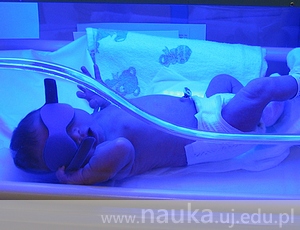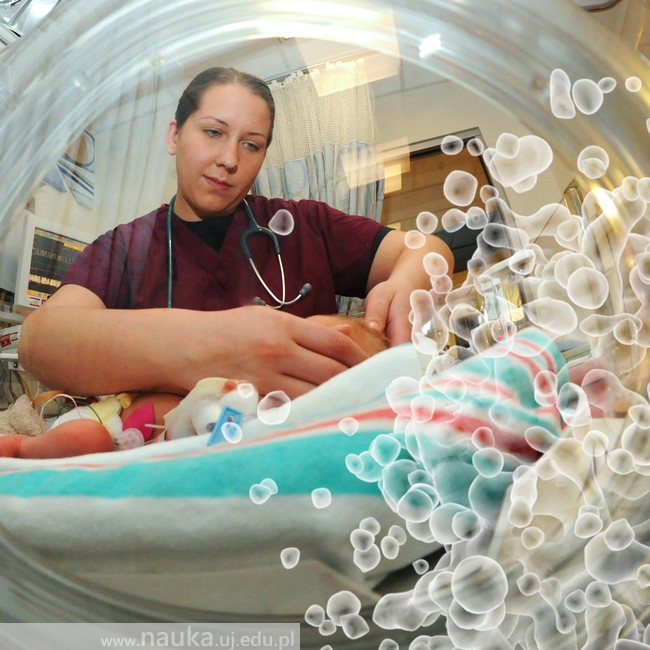
It isn’t rare for neonatology departments to treat newborns whose weight is only several hundred grams. The progress in medicine has made it possible for such small babies to survive, at the same time giving rise to many new challenges related to intense treatment of prematurely born infants.
The youngest premature infants have to undergo various invasive therapies. This makes them prone to infections, which have become a real challenge for children’s hospitals. One of the most dangerous conditions that doctors treating premature babies have to face is sepsis.
“There are strong reasons to think that immunological system isn’t fully developed in the youngest premature infants. This is probably the reason why these children are extremely susceptible to infection. Not only do they fall ill more often, but they also tend to suffer from more severe conditions than those who are born later. Our studies aim to find out which elements of their immune system function especially poorly,” explains Dr hab. Przemko Kwinta, Head of the Chair in Paediatrics and Clinic of Children's Diseases at the Jagiellonian University Medical College (JU MC).
The human immune system generally relies on two factors: acquired immunity and natural immunity. “There is no doubt that acquired immunity is underdeveloped in prematurely born children. Natural immunity, on the other hand, hasn’t yet been sufficiently studied. Despite advances in this field, many questions still remain unanswered,” says Dr hab. Kwinta. This field of immunology is currently the focus of many leading research teams all over the world. It has recently been found out that cells which play a role in natural immunity can also perform other functions, for instance, contribute to the formation of blood vessels or regulate the development of atherosclerosis.
 “The main goal of our project was to investigate how natural immunity functions, with special focus on its newly discovered elements, such as inflammasomes, IRA-B lymphocytes or monocytes with some specific markers, e.g. PD-1, which are related to programmed cell death (that is, apoptosis - a natural process during which certain cells, such as damaged ones, die in order to improve the functioning of the entire organism – editor’s note). We wanted to check if these cells are present among infants and, if so, what is their activity like”, explains Dr hab. Kwinta.
“The main goal of our project was to investigate how natural immunity functions, with special focus on its newly discovered elements, such as inflammasomes, IRA-B lymphocytes or monocytes with some specific markers, e.g. PD-1, which are related to programmed cell death (that is, apoptosis - a natural process during which certain cells, such as damaged ones, die in order to improve the functioning of the entire organism – editor’s note). We wanted to check if these cells are present among infants and, if so, what is their activity like”, explains Dr hab. Kwinta.
The results of research by the JU MC team clearly show that natural immunity in youngest infants is still underdeveloped and does not properly fulfil its role. Hence, these children are more susceptible to infection and if their fall ill, the symptoms are more severe. “The main risk factor is the infant’s age, that is, the length of pregnancy”, contends the head of the team. “The body weight at birth is definitely less important. This leads to a conclusion that body weight itself isn’t a good indicator of the general level of infant’s development.”
It’s known that adults’ natural immunity can be impaired under stress, as well as after accidents or severe injuries. Is this also the case with children who have sustained injuries or undergone surgeries? The planned next stage of the study will be aimed at answering this question, as well as investigating whether the aforementioned results concerning premature infants can be applied in diagnosis of patients from other age groups. Dr hab. Kwinta hopes that the results of the research will not only improve the understanding of the development and functioning of natural immunity, but will also allow development of novel methods of supporting its mechanisms.
Original text: www.nauka.uj.edu.pl
Selected publications:
- Zasada M., Rutkowska-Zapała M., Lenart M., Kwinta P. The role of IRA B cells in selected inflammatory processes Postepy Hig Med Dosw 2016; 70: 194-199 ICID: 1197370
- Kwinta P., Zasada M., Lenart M., Rutkowska-Zapała M., Pietrzyk J.J., Siedlar M. Evaluation of the relationship between monocyte numbers and functions and the risk of late-onset sepsis in preterm infants. JNPM 2014; 7; DOI: 10.3233/NPM-149900





